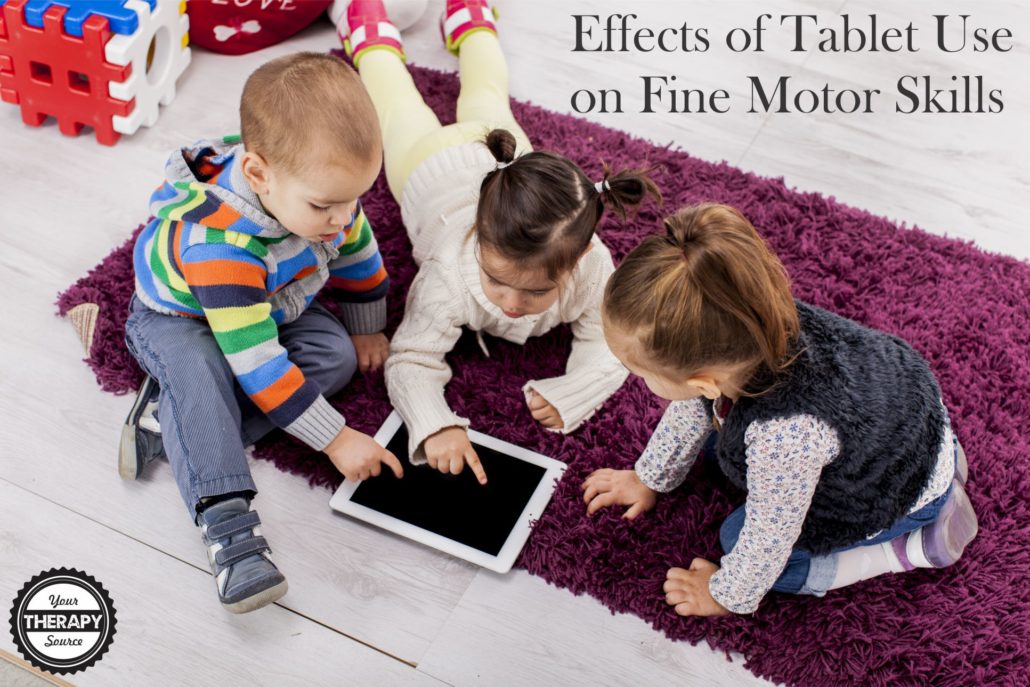Fine Motor Skills and Tablet Use
Children are using tablets, smartphones, and computers screens more and more each day. Research indicates that a higher amount of screen time is related to lower fine motor skills. But what about specifically fine motor skills and tablet use? What does the research say on the effect of touch screen tablet use on fine motor development of young children?

What Does the Research Say On Touch Screen Tablet Use and Fine Motor Skills?
Not Using a Touch Screen Tablet May Help Fine Motor Skill Development
Physical & Occupational Therapy In Pediatrics published research on 80 children (mean age = 60.1 months) to determine the effects of touch-screen tablet use on the fine motor development of preschool children without developmental delay. The children were placed in two different groups. One group of 40 children, who used a touch-screen tablet more 60 minutes per week for at least 1 month, received a 24-week home fine motor activity program using a touch-screen-tablet. The other group of 40 children, matched for age and sex, who did not meet the criteria for previous tablet use received a 24-week program consisting of manual play activities. Following the intervention, the Bruininks–Oseretsky Test of Motor Proficiency was used to measure motor skills.
Data analysis indicated the following:
- pretest analysis showed no group differences in motor performance and pinch strength.
- posttest scores showed children in the nontouch-screen-tablet group made significantly greater changes in fine motor precision, fine motor integration, and manual dexterity.
The researchers concluded using a touch screen tablet extensively might be disadvantageous for the fine motor development of preschool children.
Reference: Ling-Yi Lin, Rong-Ju Cherng & Yung-Jung Chen. Effect of Touch Screen Tablet Use on Fine Motor Development of Young Children. Physical & Occupational Therapy In Pediatrics. Published online: 10 Jan 2017. http://dx.doi.org/10.1080/01942638.2016.1255290
Not Using a Touch Screen Tablet May Help Visual Perceptual Skill Development
In a different study, the researchers investigated whether or not there were differences between 36 typically developing preschool children using tablets and non-tablets in visual perception and fine motor skills.
The results indicated that the preschoolers in the non-tablet group exhibited significantly higher scores than the preschoolers in the table group in the subtests of:
- visual discrimination.
- visual memory.
- spatial relationships.
- form constancy.
- visual figure ground.
- fine motor precision.
- fine motor integration.
- manual dexterity.
Reference: Lin, L. Y. (2019). Differences between preschool children using tablets and non-tablets in visual perception and fine motor skills. Hong Kong Journal of Occupational Therapy, 32(2), 118-126.
Posture, Fine Motor Skills, and Tablet Use
In another study completed with five young children indicated that tablet computer use resulted in less movement, muscle activity, repetitive wrist movement and poor spinal posture than toy play.
The most hand movement occurred during traditional play followed by tablet use with television viewing being the least.
The researchers concluded that all of these issues may put children at risk of musculoskeletal symptom development.
Reference: Straker, L., Campbell, A., Coenen, P., Ranelli, S., & Howie, E. (2015). Movement , posture and muscle activity in young children using tablet computers. http://www.iea.cc/congress/2015/1899.pdf
How Can You Help Children Develop Fine Motor Skills?
Busy OTs, teachers, and parents will love these Fantastic Fingers® Fine Motor Skill Builders to develop hand function in children. Three levels of fine motor activities are ready to go!
We all understand that children need practice time to develop hand function that is essential for life skills. But it can be a real struggle to find the time to create graded levels of activities to complete at home or in the classroom.
Developed by an experienced OT, Ingrid C. King, the Fantastic Fingers® Fine Motor Skill Builders includes 54 pages total of 3 levels of fine motor activities (18 pages each) plus an introductory letter in Word format (you can edit it!).




